Subdomains or Subdirectories? SE Ranking and GA Agency Partnered to Discover the Truth
In SEO circles, the debate around subdirectories and subdomains for International SEO is almost as old as time. John Mueller was answering questions about this back in 2012, and I know it was being discussed long before then too.
With this in mind, at GA Agency, we partnered with SE Ranking to discover if there were any interesting patterns in global SERPs that could shed some more light on which domain structure to use for International SEO.
We analysed over 20,000 keywords in 15 different markets worldwide. From the US to Japan and markets all across Europe.
At the very least we wanted to understand how popular different domain structures were and how prevalent International SEO domain structures were in Google’s SERPs.
We also hoped our analysis might reveal some secrets about Google’s algorithm and domain structures.
Key takeaways
- Over half of Google’s top ranking positions are held by ccTLDs globally
- ccTLDs and gTLDs are inversely correlated in Google SERPs
- Subdirectories are the second most prevalent website structure in the top three positions
- Subdomains account for just 3% of domain structures in SERPs and are only prevalent in top positions in multilingual markets
But first, if you’re not familiar with gTLDs, ccTLDs, subdomains and subdirectories, here’s a quick overview.
What are ccTLDs, gTLDs, Subdomains and Subdirectories?
Description
Domain suffixes specific to a country. They signal to search engines and users that the content is tailored for a particular geographic region.
Examples
- example.it – Italy
- example.fr – France
Description
Prefixed before your domain name and are a separation of one website into several.
Examples
- it.example.com – Italy
- fr.example.com – France
Description
Paths within a domain that organise your content for language or country targeting and remain part of an individual website.
Examples
- example.com/it/ – Italy
- example.com/fr/ – France
Description
gTLDs are domains that aren’t associated with specific locations and are typically used in conjunction with subdomains or subdirectories for International SEO purposes. But in many cases a website will target US users purely using the gTLD .com.
Examples
- example.com
- example.org
Domain suffixes specific to a country. They signal to search engines and users that the content is tailored for a particular geographic region.
- example.it – Italy
- example.fr – France
Prefixed before your domain name and are a separation of one website into several.
- it.example.com – Italy
- fr.example.com – France
Paths within a domain that organise your content for language or country targeting and remain part of an individual website.
- example.com/it/ – Italy
- example.com/fr/ – France
gTLDs are domains that aren’t associated with specific locations and are typically used in conjunction with subdomains or subdirectories for International SEO purposes. But in many cases a website will target US users purely using the gTLD .com.
- example.com
- example.org
How We Categorised Domain Structures
For this study, most domain structures fit within the definitions above, but there were some anomalies:
Description
Corresponding subdirectory and ccTLD
Research Categorisation
ccTLD
Description
Corresponding subdomain and ccTLD
Research Categorisation
subdomain
Description
Corresponding subdomain and subdirectory
Research Categorisation
subdomain
Description
No ccTLD, subdomain or subfolder corresponding to the market analysed
Research Categorisation
gTLD with no subdomain or subdirectory
Corresponding subdirectory and ccTLD
ccTLD
Corresponding subdomain and ccTLD
subdomain
Corresponding subdomain and subdirectory
subdomain
No ccTLD, subdomain or subfolder corresponding to the market analysed
gTLD with no subdomain or subdirectory
Research Methodology
- We used SE Ranking to collect data and analysed 20,000 keywords across 15 different markets, counting how often each website structure appears in each Google position from 1-100.
- We looked at ccTLDs, gTLDs with subdomains, gTLDs with subdirectories and also gTLDs with no evidence of market specific subdomains or subdirectories.
- We did not include website structures using URL parameters in this study, as they are not recommended.
- We used transactional or purchase intent e-commerce keywords across all languages, with some variations depending on language nuances.
- Markets analysed: AT, CH-DE, CH-FR, CH-IT, CZ, DE, ES, FR, HU, IT, JP, PL, PT, RU, SE, TR, UK, US
The Results
Here we’ve published the main global insights, but you can find a full breakdown of the results with additional country-specific insights over on GA Agency’s International SEO Domain Structures blog.
Over half of Google’s Top Ranking Positions are held by ccTLDs Globally
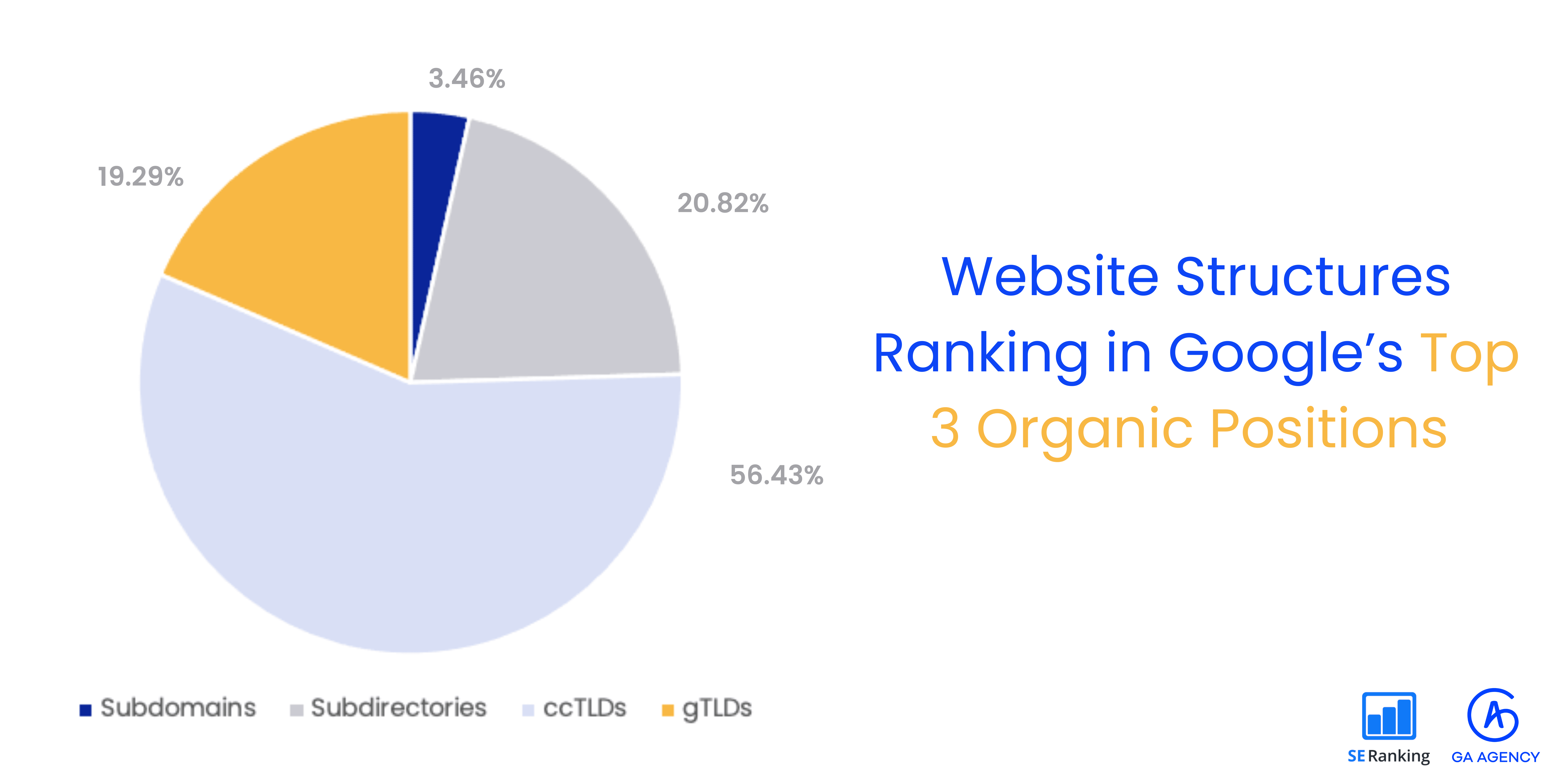
Our data reveals that ccTLDs are the most prevalent website structure in the top three ranking positions by some distance. This comes as no real surprise, as we know ccTLDs are one of the strongest localisation signals we can provide to Google.
But does this mean you should always recommend ccTLDs when expanding into new international markets? Not necessarily.
ccTLDs come with some downsides when you are targeting multiple locales. They can be expensive and inefficient to manage, so only choose them if you are confident they are the right solution for you.
ccTLDs and gTLDs are inversely correlated in Google SERPs
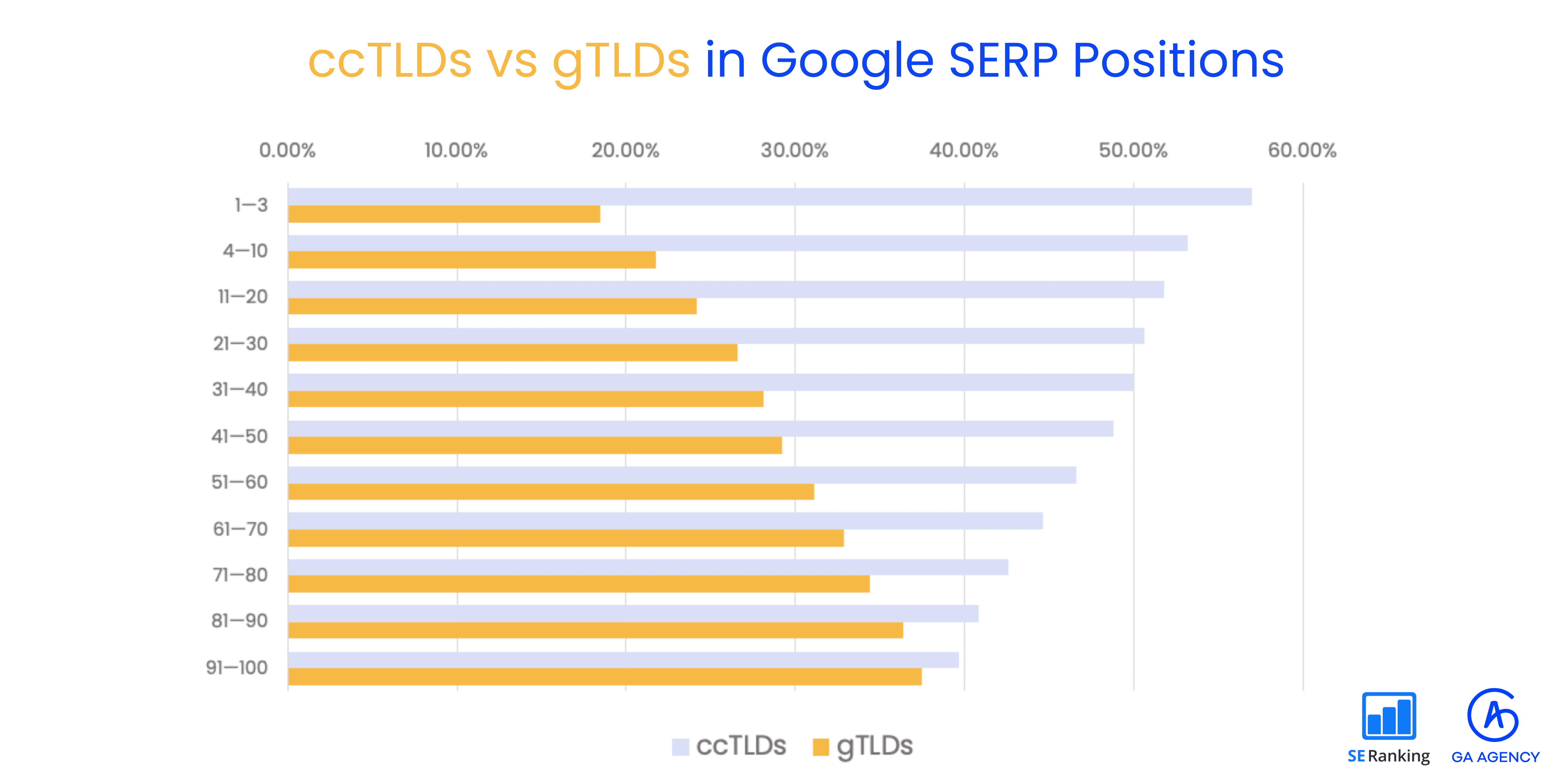
While ccTLDs are most prevalent in the top ranking positions globally, gTLDs with no market subdomains or subdirectories are inversely correlated with ccTLDs as you go from position 1 to 100.
Subdirectories are the second most prevalent website structure in the top three positions
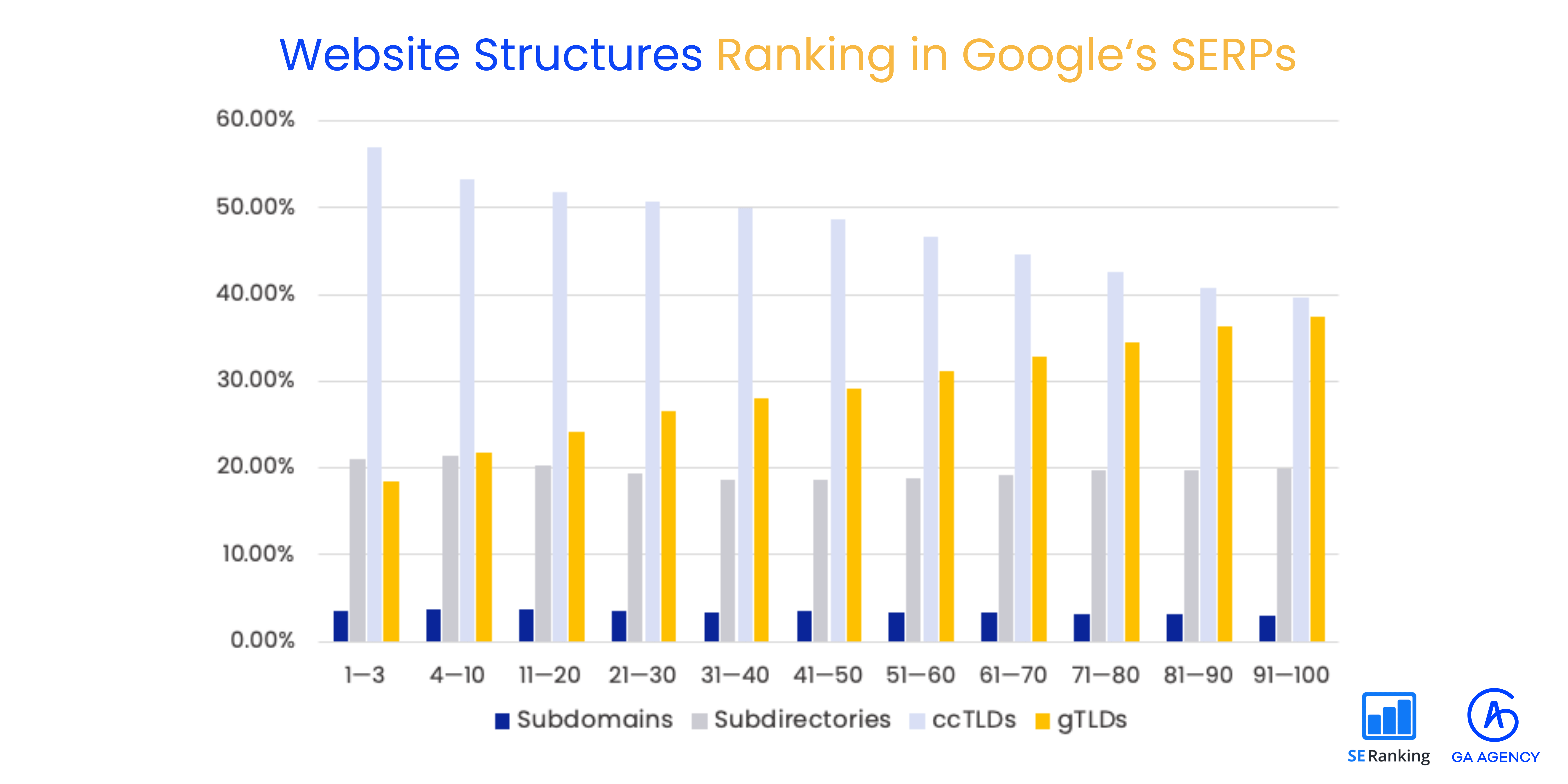
Subdirectories are often considered the best option for international brands targeting multiple locales. Our research reflects that assumption, with subdirectories accounting for over 20% of the top three ranking positions.
The fact that subdirectories account for around 20% of all SERP positions also reflects that they are a popular choice for webmasters or SEOs recommending domain structures within their organisations or to their clients.
Subdomains account for just 3% of domain structures in SERPs and are only prevalent in top positions in multilingual markets
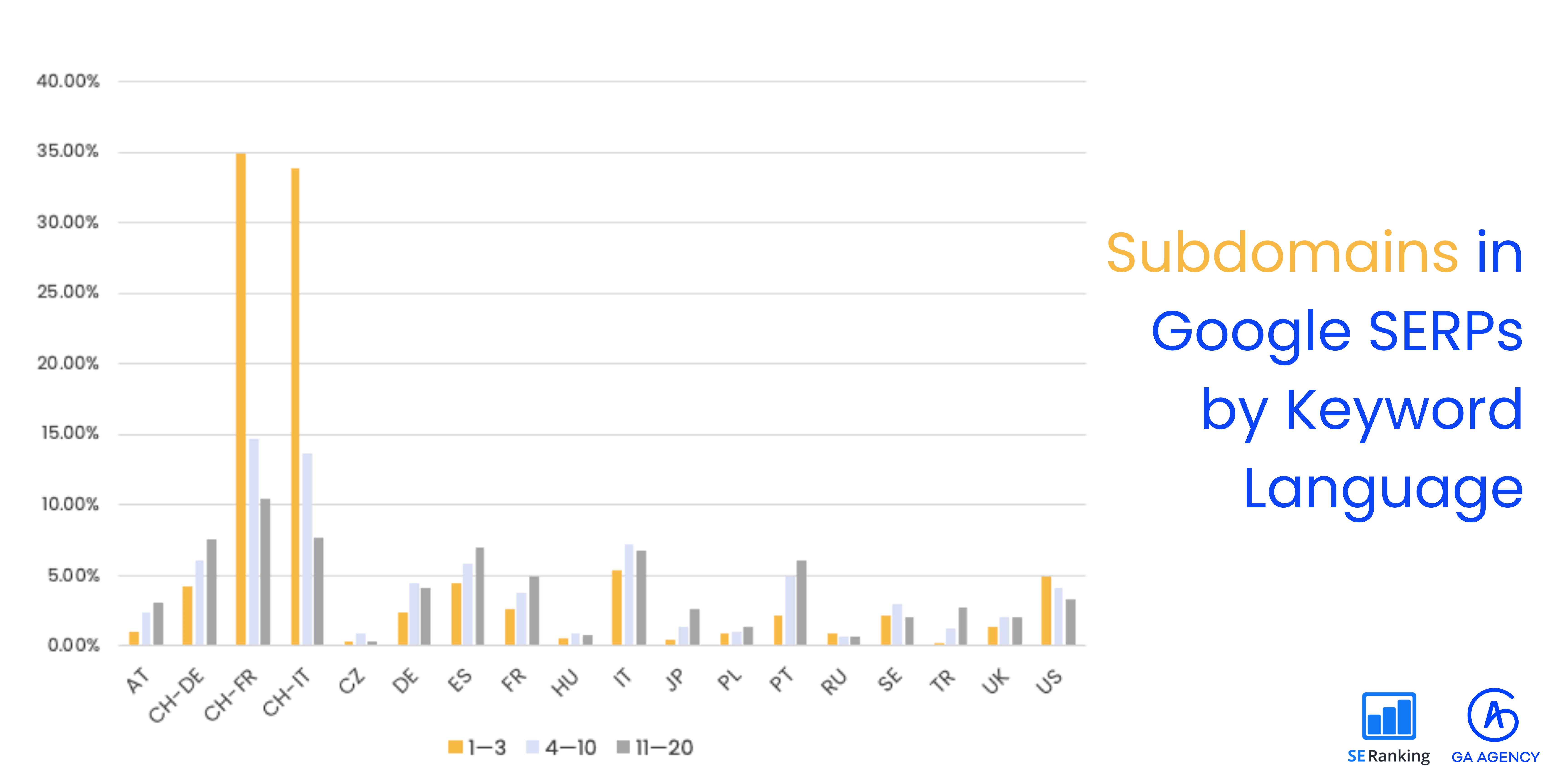
Subdomains are so often the unloved child when it comes to SEO. Sure, you could use them, but why would you want to?
Well, the fact that subdomain usage is clearly quite successful in Switzerland for French (CH-FR) and Italian (CH-IT) language keywords does suggest they can be used well.
However, the global data reveals that it is uncommon to see subdomains when analysing primary market languages.
Why Was SE Ranking the Perfect Tool for this Research?
At GA Agency, we really love working with the SE Ranking tool. There’s loads of great features and the data is always reliable.
For our research, we needed to be able to analyse over 1.5 million SERP positions across 20,000 keywords globally.
In SE Ranking, this is easily done by using the SERP Competitors tab within your account. Simply navigate to this page in your SE Ranking account and you can export all the data you require for every keyword you’re tracking at a click of a button.
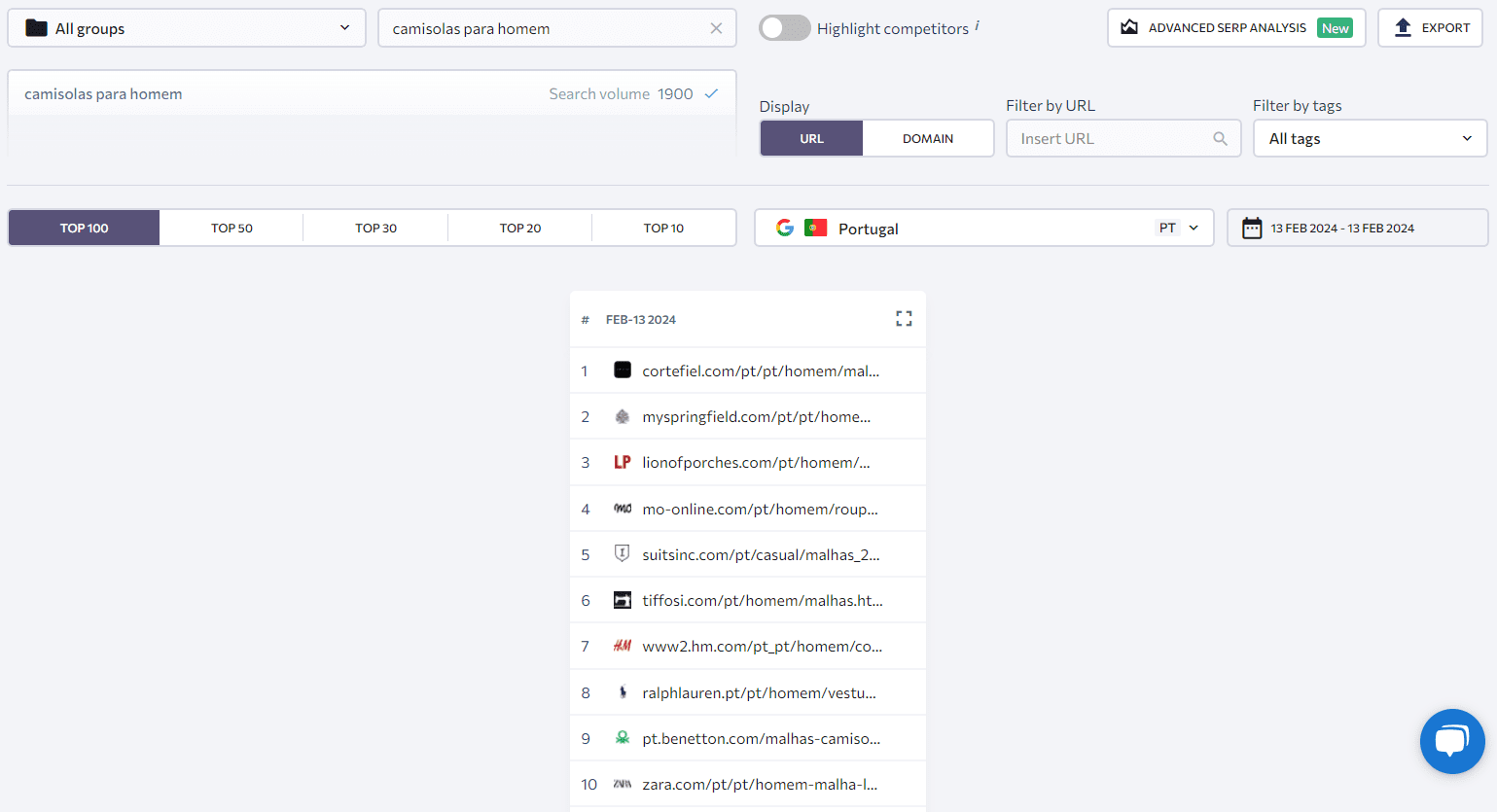
For example, you can see that for the keyword camisolas para homem in Portugal, subdirectories make up the 8 of the top 10 ranking positions, with only Ralph Lauren and Benetton with alternative ccTLD and subdomain strategies.
What Does This Data Mean for Your International SEO Strategy?
The insights from this data suggest ccTLDs have the best chance of ranking in the top positions in Google. If you can commit to ccTLDs in every market you are targeting, they are perhaps the best domain strategy to go with. Just bear in mind that they do require more resources to build, maintain and optimise than other options.
Subdirectories are clearly popular with SEOs and website owners, but evidence from the Swiss market suggests that subdomains can be just as effective. So perhaps we shouldn’t always be so quick to discount the long maligned subdomain?
Ultimately, whichever option you choose can be successful if your site is well optimised. It could also depend on the number of markets you’re looking to be active in and what sort of awareness your brand has in those markets. There are a lot more considerations that go into International SEO, which you can read about in our International SEO white paper.

